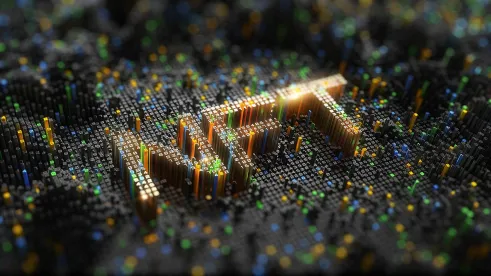As use cases for NFTs evolve from digital collectibles to more functional assets, sellers need to be more mindful than ever of what they are selling. There are still intellectual property related risks for any content associated with an NFT. And new functionalities for NFTs – new ways in which they are being used – could trigger legal and regulatory regimes designed for more traditional assets. Sellers should take a step back and ask themselves, stripped of the NFT label, what are they selling and what will buyers do with it.
Kyle Casazza, Litigation, Los Angeles
Expect NFTs to increasingly intersect with other technologies, creating both new opportunities and challenges. We are seeing, for example, a growing crossover between NFTs and artificial intelligence, not only in generative AI-created NFT content but also in “intelligent” AI-powered NFTs that evolve and can be utilized, trained and interacted with in metaverses. This convergence presents complex legal issues, such as those related to intellectual property, confidentiality, rights of publicity and privacy. More generally, we’ve taken a variety of creative approaches in helping clients structure the intellectual property, economic and other rights that buyers receive when acquiring an NFT, with some companies opting to integrate NFT features characteristic of regulated assets and conducting sales accordingly.
Wai Choy, Technology, Media & Telecommunications, New York
The applications of NFTs, NFT marketplaces, blockchain and web3 technologies generally continue to evolve and become ever more sophisticated. While the technology and the user-facing applications – including both on-chain and off-chain applications – develop at a very rapid pace, the law is creeping along at a much slower pace. While we have seen some cases in the area, particularly focused on intellectual property issues, we expect to see new and unique issues arise as new applications of the technology continue to emerge. As with many other technology innovations, courts will struggle to apply laws and principles that were developed well before NFTs were ever conceived of. Both transactional lawyers and litigators working in the blockchain, NFT and web3 space will have fun times ahead!
Jeffrey Neuburger, Technology, Media & Telecommunications, New York
Regulators are still figuring out how to approach NFTs. The way they end up treating any given NFT may depend, in large part, on how that NFT is similar to things we have seen before and how it is different. For example, does a particular NFT have value because it is something unique, like a work of art, because it can be exchanged as currency, or because it can be used as an investment tool? The answer will not only help gauge regulatory risk, but it likely impacts the business case for the NFT.
Seetha Ramachandran, Litigation, New York






 />i
/>i

